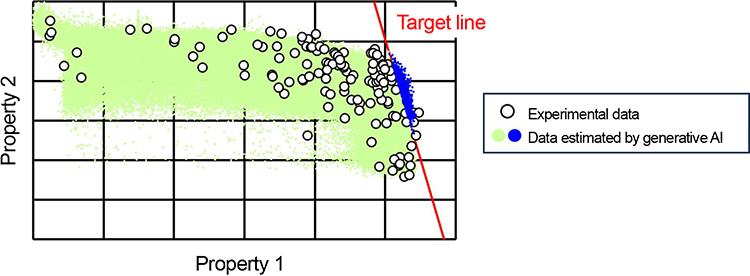Newly-Developed Materials Informatics Platform D2Materi™
Proterial, Ltd.
Proterial, Ltd. (hereinafter referred to as Proterial) has developed a proprietary Materials Informatics (MI) platform “D2Materi.” D2Materi takes a data-driven approach in estimating materials characteristics and designing new materials. It extracts the correlation between materials performance or composition and processes, laws, and characteristics, from accumulated data, including data of metallic materials, which is not common. With this advanced approach, the platform will solve the challenge of designing materials efficiently.
1. Background/overview
MI is a technology for improving the efficiency of materials development by using informatics (information science) such as statistical analysis and machine learning. With the advancement of informatics in recent years, integrating MI into materials development, which used to be manual work based on the trail-and-error method, is spreading in various countries with the aim of enabling reductions in development time.
Proterial’s strength lies in its metal-centered structure/composition control techniques and strong relationships with a wide variety of customers. Developing the two strong points synergetically, we have explored new material fields and new markets and increased our customer base. We believe that MI will help us raise the possibility of low-cost efficient development of products responding to customers’ needs: high strength, flexibility, and durability; light weight; and prioritized use of naturally abundant elements. To realize this, Proterial launched into development of MI, based on the structure/composition control techniques and scientific findings we have accumulated. We are proud to announce here that we have developed an MI platform, D2Materi, which extracts a variety of feature values*1 of materials including metals and allows generative AI to be used.
2. Features of D2Materi
(1) Extracting a wide variety of feature values
The structure of a metallic material that determines the performance of the material depends not only on its composition such as components and their quantities but also on the production process. Since the production processes and structures of metallic materials have not been databased, machine learning models have a characteristically low prediction accuracy. D2Materi, however, is capable of databasing the production processes and structures of materials and extracting a variety of feature values produced by combining Proterial’s own compositions and processes. Consequently, quantification of the characteristics and performance of materials, which depends on complicated conditions, becomes possible. With the platform, we can raise the performance of a material having characteristics conflicting with one another. We can also improve the efficiency of experiments, prototyping, and evaluation conducted for examining hypotheses formulated in developing innovative materials.
(2) Material design modelling using generative AI
D2Materi will be able to improve the accuracy of extrapolation*2 since it is equipped with a unique proprietary algorithm that utilizes generative AI. The platform can estimate data outside a known range, from actual data obtained in experiments. It is also highly capable of estimating conditions for producing materials having new characteristics without being bound by actual result information. With the platform, we can design and develop innovative high-performance materials.

(3) Extracting written materials and patent documents by AI
With AI, D2Materi can extract the desired data with high accuracy from an enormous amount of information such as documents on materials and patent documents. It can automatically and efficiently collect information on materials and form a knowledge base for research and development.
Speeding up development of advanced materials with D2Materi, Proterial strives to solve social issues such as fuel efficiency, energy conservation, and decarbonization.
- *1Feature value: Value of a feature that represents an object and supplies a clue for prediction
- *2Extrapolation: To estimate a value outside a known range, from known numerical data
- [Media inquiries]
Corporate Communications Dept., Proterial
https://www.proterial.com/e/contact/
D2Materi is a trademark of Proterial, Ltd.